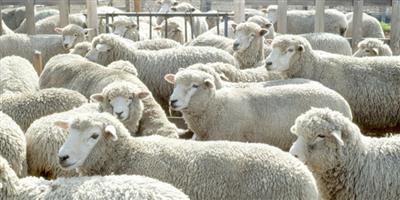Helena, MT: We, the Montana Wool Growers Association (MWGA) and the Montana Wild Sheep Foundation (MTWSF) are representatives of Montana’s sheep industries, both domestic and bighorn. On March 24, 2016 we met in Choteau to discuss our mutual interests in enhancing Montana’s bighorn sheep population, while protecting Montana’s existing agriculture operations. We do not see these goals as mutually exclusive. As our two organizations came to the table to find realistic and practical solutions to issues facing both the domestic and wild sheep industries in Montana, it became apparent that our common ground was far greater than our differing opinions.
Both organizations firmly believe in sound conservation practices, defined as prudent use of our natural resources, with a strong desire to see Montana's bighorn health and herd sizes increase while maintaining Montana's ranking in the top 10 domestic sheep producing states in the U.S. We jointly believe there is room on the Montana landscape for both domestic and bighorn sheep, just not in a manner that allows for comingling.
Both the MWGA and MTWSF are troubled by the growing trend of environmental groups using lawsuits as the means to push wildlife management agendas that neither promote multiple use of public lands nor allow Montana sportsmen to have a say in the management of wildlife species they fund through purchase of hunting licenses. We are also troubled by growing divisions in Montana’s Legislature that result in attempts to pit our two organizations against each other, and that result in win-lose scenarios that fracture both Montanan’s cherished private property rights and cherished public trust resources. This is not a productive exercise for either Montana’s bighorn sheep or domestic sheep interests. What is productive is for organizations like ours to sit down, roll up our sleeves, and work to find and implement on the ground solutions to our mutual problems.
MWGA and MTWSF will strive to accomplish our mutual goals of a healthy and value-added domestic sheep industry and healthy, growing and robust bighorn sheep populations, for the benefit of sportsmen, sheep producers, wildlife viewers, and general citizens, through science-based management, research, and on-the-ground application of current knowledge. For this to be accomplished, MWGA and MTWSF understand the important role collaborative efforts between private landowners, the domestic sheep industry, and Montana’s sportsmen play in protecting and enhancing Montana’s bighorn sheep population and domestic sheep industry. Cooperation, not litigation, is the key to meeting Montana FWP’s Conservation Strategy of establishing five new bighorn herds in Montana each decade. Such cooperation comes in the form of on-the-ground management actions such as maintaining spatial and physical separation between domestic sheep and bighorn sheep; ensuring that existing agriculture operations are not evicted from public lands as a result of bighorn sheep conservation efforts; applying results from predator/prey research; and implementing effective predator control efforts where required. In addition, we mutually believe in and advocate for well-designed bighorn sheep transplants and augmentation programs, mitigating loss of bighorn habitat to quickly escalating human development in areas proximate to or within bighorn herds, and delivering adequate funding, at both the state and federal levels, for bighorn and domestic sheep disease surveillance, collaborative research, and animal/range science knowledge.
With these aforementioned efforts in mind, moving forward, we intend to utilize the best available science in order to make the most informed management decisions. We will mutually promote both wild and domestic sheep, as both sides strive to find ways to profitably produce domestic sheep safely-separated from bighorn sheep, allowing Montana's wild sheep populations to expand their distribution.
Jointly, our two groups support continued funding of research in regard to disease transmission between domestic and bighorn populations, and also concur that, at present, while the science on bighorn pneumonia is being developed, the best method to prevent disease transmission is effective separation in time and space. While both group’s missions would be made far easier if the federal court weren’t used as a surrogate to overturn sound state wildlife management policies, this collaborative approach is the only reasonable solution on the Montana landscape until such time as there can be federal litigation reform.
For this to succeed, we ask additional support from Montana Governor Bullock’s Office, Montana Departments of Fish, Wildlife, and Parks and Livestock and Agriculture; Montana State University Agriculture and Wildlife researchers, Washington State University Rocky Crate Foundation, and Idaho State University Agriculture/Wildlife research units; Montana Tribes; U.S. Department of Agriculture and Interior (Forest Service, BLM, ARS, USSES, etc.); agriculture interests and industry groups, conservation organizations, sportsmen groups, the Montana Legislature, and interested citizens. The next step in this process will be launching an all-inclusive interaction working group to develop long-term solutions and strategies for both domestic and bighorn sheep in Montana. MWGA and MTWSF will jointly lead this effort as the primary stakeholders; however, this interaction working group will be open to all agencies, individuals, and groups that are interested.
Although we each favor different specific aspects of Montana’s natural resources, we should all agree on the overall goals of wise management and conservation of our natural resources and enhancing the Montana way of life for future generations of Montanans. With people at the table willing to do the hard work to find solutions, our mutual goals of maintaining and expanding healthy, huntable bighorn sheep populations and maintaining healthy domestic sheep production in Montana can be achieved without lawsuits, litigation and win-lose legislation.
/s/ /s/
Brian Solan Dave McEwen
President President
MT Wild Sheep Foundation MT Wool Growers Association
Helena, MT Galata, MT
Source: the Montana Wool Growers Association and the Montana Wild Sheep Foundation
Photo courtesy of USDA NRCS


